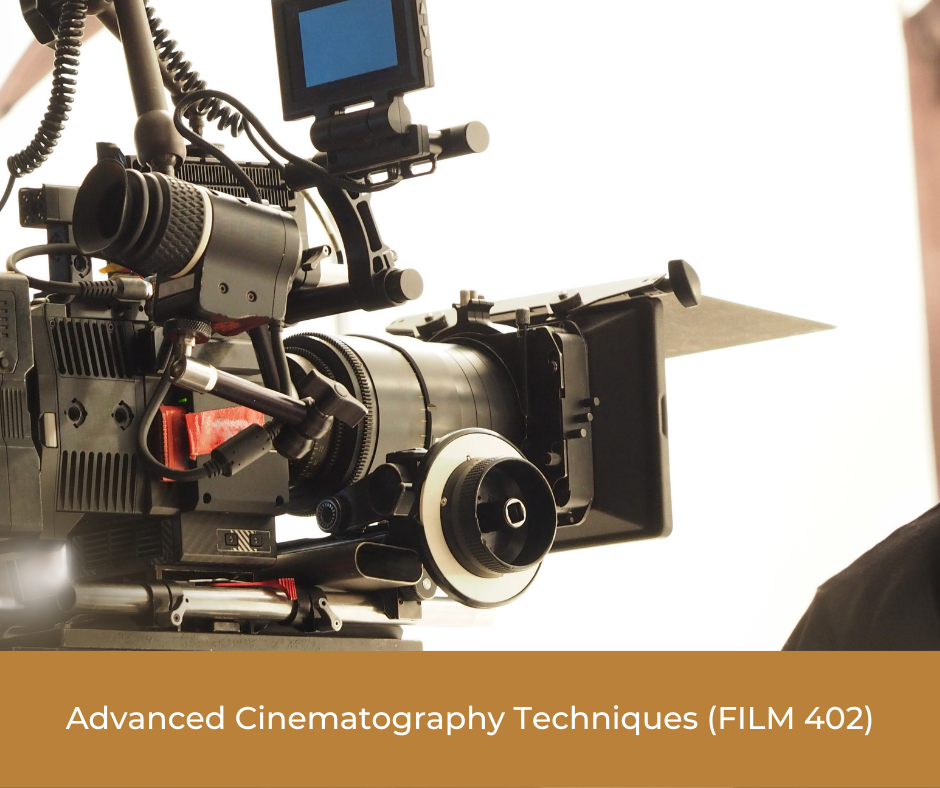“FILM 402: Advanced Cinematography Techniques” is an advanced-level course that delves deeply into the art and science of cinematography. Building on the foundational principles of cinematography, this course explores advanced camera movements, lens selection, and lighting setups essential for crafting visually captivating cinematic narratives. Through both theoretical study and practical application, students develop a mastery of cinematographic techniques that elevate their storytelling abilities.
Outline of Major Content Areas:
- Advanced Camera Movements: In-depth exploration of advanced camera movements, including dolly shots, crane shots, and aerial cinematography. Students learn to execute complex camera movements effectively.
- Lens Selection and Optics: Study of lens selection, optics, and their impact on image quality, depth of field, and visual aesthetics. Practical exercises involve experimenting with various lenses.
- Advanced Lighting Techniques: Examination of advanced lighting setups, including high-key and low-key lighting, chiaroscuro, and color temperature. Students gain hands-on experience in creating mood and atmosphere through lighting.
- Cinematic Composition: Advanced composition techniques for framing shots, including the rule of thirds, leading lines, and visual symmetry. Students learn to use composition to convey narrative themes.
- Cinematography and Storytelling: The relationship between cinematography and storytelling, with a focus on visual storytelling techniques, visual motifs, and subtext.
- Cinematic Aesthetics: Exploration of the aesthetics of cinema, including the use of color, texture, and visual style to enhance narrative impact.
- Camera Technology: Discussion of the latest advancements in camera technology, including 4K and beyond, high dynamic range (HDR), and digital cinematography.
- Cinematography Case Studies: Analysis of scenes from iconic films to understand the cinematography choices made by renowned directors and cinematographers.
Course Learning Outcomes:
Upon completing FILM 402, students will:
- Advanced Camera Handling: Demonstrate proficiency in handling advanced camera movements, achieving smooth and precise shots.
- Lens Expertise: Understand the principles of lens selection and optics, applying this knowledge to enhance visual storytelling.
- Masterful Lighting: Apply advanced lighting techniques to create mood, atmosphere, and visual impact in cinematic scenes.
- Cinematic Composition: Implement advanced composition techniques to frame shots effectively and convey narrative themes.
- Visual Storytelling: Employ cinematographic techniques to enhance storytelling and subtext in cinematic narratives.
- Aesthetic Sensibility: Develop a keen aesthetic sensibility, utilizing color, texture, and visual style to create visually striking films.
- Camera Technology Awareness: Stay updated with the latest camera technologies and their relevance to modern cinematography.
- Cinematography Analysis: Analyze and deconstruct scenes from iconic films, gaining insights into the choices made by renowned cinematographers.
Methods for Assessing Student Learning:
Student assessment in FILM 402 includes a combination of practical assignments and theoretical understanding:
- Advanced Camera Movements Projects: Assessment of projects involving advanced camera movements, evaluating students’ ability to execute complex shots.
- Lens Selection and Lighting Exercises: Evaluation of exercises focused on lens selection, optics, and lighting setups.
- Cinematic Composition Portfolio: Assessment of a portfolio showcasing students’ mastery of composition techniques in framing shots.
- Visual Storytelling Analysis: Analysis of cinematic scenes to assess students’ understanding of visual storytelling.
- Cinematic Aesthetics Presentation: Presentation of a cinematic aesthetics project, demonstrating the application of color, texture, and style in filmmaking.
FILM 402 equips students with the advanced cinematographic skills and insights required to excel in the world of filmmaking, enabling them to create visually stunning and impactful cinematic works.
